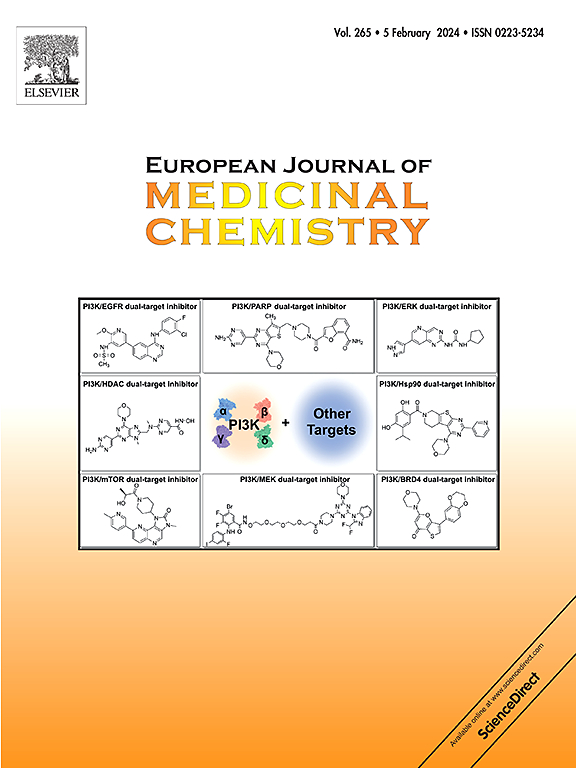发现XZ338,一种高效的BCL-XL降解剂
IF 6
2区 医学
Q1 CHEMISTRY, MEDICINAL
引用次数: 0
摘要
BCL-XL是一种重要的抗凋亡蛋白,参与肿瘤发生和对癌症化疗的耐药性。从传统抑制剂到PROTAC降解剂的过渡显示出很好的潜力,特别是在最小化与BCL-XL抑制相关的靶血小板减少方面。然而,报道的BCL-XL降降剂大多来自BCL-XL/BCL-2双抑制剂ABT-263, ABT-263也抑制或降解BCL-2,并且在与常规化疗联合使用时可能导致中性粒细胞减少,如ABT-263在临床上所见。本研究的目标是开发一种高度特异性的无BCL-2抑制/降解的BCL-XL降解剂。在本研究中,从BCL-XL特异性抑制剂a -1331852衍生出高效、选择性的BCL-XL降解剂XZ338。XZ338对MOLT-4 T-ALL细胞的效力是ABT-263的70倍,对MOLT-4细胞对人血小板的选择性超过89倍。本文章由计算机程序翻译,如有差异,请以英文原文为准。

Discovery of XZ338, a highly potent BCL-XL degrader
BCL-XL is a crucial anti-apoptotic protein involved in tumorigenesis and resistance to cancer chemotherapy. Transitioning from conventional inhibitors to PROTAC degraders has shown promising potential, particularly in minimizing the on-target thrombocytopenia linked to BCL-XL inhibition. However, reported BCL-XL degraders were mostly derived from BCL-XL/BCL-2 dual inhibitor ABT-263, which also inhibits or degrades BCL-2 and can potentially cause neutropenia when combined with conventional chemotherapy as seen with ABT-263 in the clinic. The goal of the present study is to develop a highly specific BCL-XL degrader without BCL-2 inhibition/degradation. In this study, XZ338, a highly potent and selective BCL-XL degrader derived from BCL-XL specific inhibitor A-1331852, was generated. XZ338 is 70-fold more potent than ABT-263 against MOLT-4 T-ALL cells, with over 89-fold selectivity for MOLT-4 cells over human platelets.
求助全文
通过发布文献求助,成功后即可免费获取论文全文。
去求助
来源期刊
CiteScore
11.70
自引率
9.00%
发文量
863
审稿时长
29 days
期刊介绍:
The European Journal of Medicinal Chemistry is a global journal that publishes studies on all aspects of medicinal chemistry. It provides a medium for publication of original papers and also welcomes critical review papers.
A typical paper would report on the organic synthesis, characterization and pharmacological evaluation of compounds. Other topics of interest are drug design, QSAR, molecular modeling, drug-receptor interactions, molecular aspects of drug metabolism, prodrug synthesis and drug targeting. The journal expects manuscripts to present the rational for a study, provide insight into the design of compounds or understanding of mechanism, or clarify the targets.

 求助内容:
求助内容: 应助结果提醒方式:
应助结果提醒方式:


